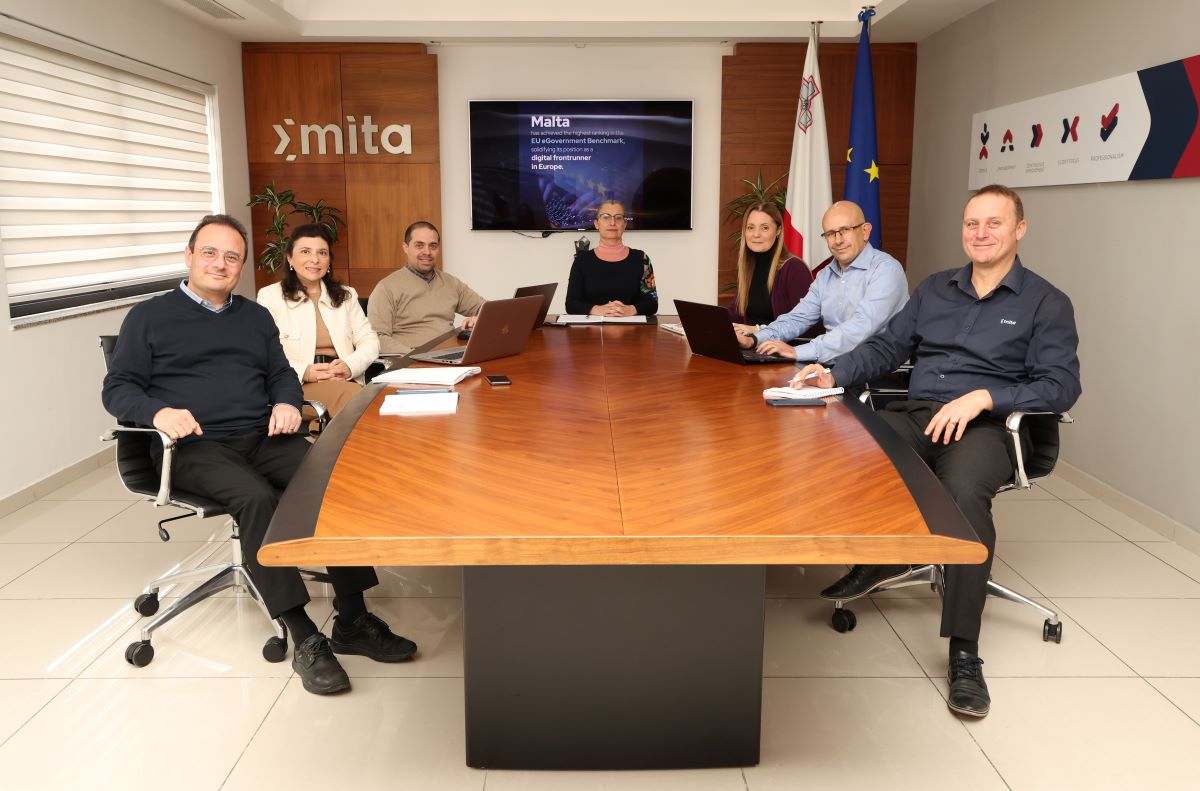Malta has ranked first in the EU eGovernment Benchmark since at least 2012, reflecting the considerable ongoing investment in the online interface that businesses and citizens can use to interact with the Government.
Being top of the table is always welcome, but what this means, exactly, can be difficult to discern, so BusinessNow.mt caught up with MITA’s head of the eGovernment Services Department, Priscilla Bugeja, to get a rundown of what is assessed and against which criteria, while taking the opportunity to learn more about this important Agency’s work over the years.
Ms Bugeja joined MITA as a software developer straight out of university after completing a summer internship at the then-fledgling Agency and deciding: “This is where I want to work,” she says. Over her close to 30-year career, she gradually worked her way up the ranks, with her contribution to the development of National Police Systems and Schengen Information System, which support the implementation of the Schengen Treaty and the facilitation of cross-border travel, being a particular highlight. Five years ago, she was appointed head of the eGovernment Services Department.

The eGovernment Benchmark, Ms Bugeja explains, is an annual assessment of the digitalisation of national government services, carried out by the European Commission. Apart from the EU27, the assessment also includes Iceland, Norway, Switzerland, Albania, Montenegro, North Macedonia, Serbia and Turkey.
The benchmark assesses around 100 services across nine key life events. These are packages of government services, usually provided by multiple departments or agencies, that support citizens or entrepreneurs through key points in their lives, such as the birth of a child or the start of a new business. These life events include Start-up and Regular Operations on the business side, while for citizens they are comprised of Moving, Transport, Justice, Health, Family, Career and Studying. Each service is scored on user centricity, transparency, key enablers and cross-border services.
In all areas and against each criterion, Malta excels, scoring 100% in user centricity (1st place, with the EU average being 62 per cent), 98 per cent in transparency (again 1st place, with the EU averaging 62 per cent), 95 per cent in key enablers (3rd place, against the EU’s average of 71 per cent), and 90 per cent in cross-border services (another 3rd place, but well over the EU’s average of 57 per cent). Overall, Malta achieved a score of 96 per cent, improving on the 95 per cent scored in 2022. The EU average, meanwhile, is 70 per cent.
A closer look at the individual life events yields similarly impressive results. Malta ranks first in no fewer than six of these (Business Start-up, Transport, Justice, Family, Career and Studying), and ranks second in Regular Business Operations, third in Health, and sixth in Moving.
MITA’s primary role in the benchmark exercise is to serve as the Commission’s contact point. However, in a broader context, much of what the assessment covers is in fact facilitated by the products that MITA provides to the Government for it to build its services. These include a workflow automation solution used to build online forms, a payment gateway used by all Government portals requiring payment, and the notification platform used for eID login and other Government services which send SMS notifications.
“We have no direct interaction with citizens,” she says. “Everything we do is in collaboration with the respective departments and entities, which then use our solutions to provide citizens and businesses with the online services they need.”
While the eGovernment Benchmark considers the provision of services, other assessments take other factors into account. Ms Bugeja notes that while the Maltese Government is at the forefront in providing its services online, the actual use of these services is always a challenge. However, there was a considerable increase in recent years, with the most significant one being from 63 per cent in 2020 to 72 per cent in 2021, thus exceeding the EU’s average of 65 per cent. The latest survey by the National Statistics Office survey carried out in 2022 reconfirmed that the noticeable increase in take-up seen during the COVID-19 pandemic was sustained at 73 per cent.
Achieving a 73 per cent usage rate in a country is no mean feat, but Ms Bugeja shines a light on another factor, other than limited digital skills and lack of awareness, that may be holding people back from using the Government’s online services. “eGovernment services take-up is an issue everywhere,” she asserts, “but in Malta an additional challenge is the proximity to the physical Government offices.”
In other words, a Maltese citizen living anywhere in the country can easily go to a Government office in Valletta or in a servizz.gov hub nearby, whereas someone living in a rural village in a European country would think twice before visiting a government office which typically would be located in a distant city.
Having been with MITA for so long, Ms Bugeja is able to pinpoint two particular initiatives that changed the way citizens and businesses interact with Government.
“The articulation of a comprehensive eGovernment Vision and Strategy for Malta in 2000 was pivotal,” she recounts. “It was like a switch was flipped, as we realised that the internet was becoming an attractive channel for service provision. Up to that point we were building IT applications which primarily focused on automating the Government’s own processes and internal systems. It was time to start moving these systems and their information closer to the citizen.” This strategy also laid the foundations which transformed Malta into an information society and the creation of a dynamic information economy.
Ms Bugeja recalls the mobilisation of resources both within MITA and Government to launch the first 10 eGovernment flag bearers which included online services and websites related to Libraries, Licences, Local Councils customer care, Gozo, Exams, Court Judgements, VAT, IRD web forms and Income Tax and Social Security contributions calculators.
“That was when the shift began, and we have never looked back,” she says.
Another major initiative commenced in 2016 with the launch of the Mobile Government Strategy for 2017-2018, during a period when the prevalence of mobile phones both necessitated and facilitated a move to make all services mobile-friendly. “This brought about a big push to see if we could maximise the functionality of mobile devices and ensure that all Government services could be accessed from everywhere and at any time, since access was no longer dependent upon a user sitting behind a desktop computer or laptop.”
A number of new mobile apps were launched over the two-year period of the Strategy covering several sectors within Government, including culture, consumers, animal welfare, crafts, customs, taxation, flora and fauna, tourism, Gozo, public cleansing and rating of public service delivery, amongst others. In addition to supporting the Ministries’ CIOs during the implementation of the mobile apps, MITA was also responsible for the development of the maltapps, which serves as a launcher for every online service provided by the Maltese Government.
“We – that is, MITA together with the Office of the Principal Permanent Secretary, servizz.gov, Ministry CIOs and Heads of Department from across the Public Service – implemented what was needed to lay the groundwork for mobile services,” continues Ms Bugeja. “From then onwards, developing for mobile became standard procedure. When introducing a new service, it is mobile-friendly from its inception. But that big push was needed.”
The digital world is always evolving, and with it so must the Government solutions. The eGovernment Services Department is currently working closely with the Office of the Prime Minister on the implementation of a Corporate Electronic Document Management System, one of the key initiatives in the Public Service’s vision of achieving a service of excellence, and driven by the need to improve document organisation, enhance collaboration and strengthen data security.
“There’s always something significant going on,” says Ms Bugeja. “Thankfully, we can say that Government investment in IT has never stopped, and I dare say, has increased exponentially these last few years.”
At the heart of it all is a mission to make life easier for people and businesses alike: “It’s not about going online just for the sake of it,” she concludes. “We have to ensure that nobody is left behind. This push must not create any divide.”
Employer bodies call urgent MCESD meeting over ‘serious concerns’ about PM statements on judiciary
Prime Minister Robert Abela has repeatedly questioned the timing of the publication of the Vitals inquiry
Political earthquake in Malta: A rundown of politicians, civil servants and businesses facing charges
Joseph Muscat is the first former PM in Malta’s history to be facing criminal charges
BOV’s points to ‘strong governance structure’ as questions resurface about €36 million loan to Steward
The bank also declined to comment on the €400,000 golden handshake given to its former chief risk officer






